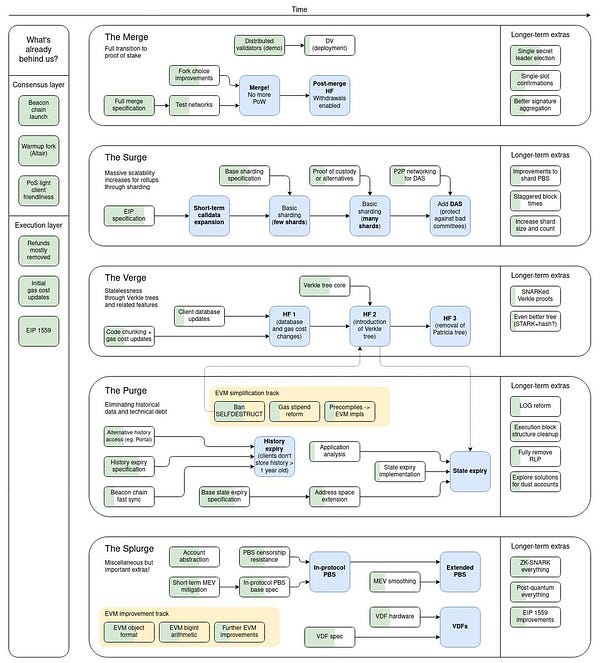Hello & welcome back!
Hope you arrived in the new year safely.😌
There is never too late for some new years resolutions like it’s never too late for some new years predictions! 💪🏻
So here we go 🚀
What´s in store for Financial Services in 2022? 🔮
Photo by Michael Dziedzic on Unsplash
If Nostradamus had been a banker… we would possibly get some prophecies about what is about to go down in financial services this year. But he wasn’t into fintech or banking at all. So we have to rely on our field experts to predict which trends will most probably rule the year 2022 in financial services.
Here are the top 5 trends to be expected by financial experts:
🔮 1.) Embedded Finance
The term Embedded Finance is used to describe the seamless integration of financial services into a traditionally non-financial platform.
A recent study conducted by Solarisbank in collaboration with the Handelsblatt Research Institute analyzes the willingness of German consumers to use financial services from a selection of leading online shops. The study found that 61.4% of all respondents said that they would be open to using a financial service from at least one of the online shops surveyed.
As reported by Sifted “The focus on client experience means companies are increasingly delivering services to customers when and where they want them. In that context, there’s no sense in logging on to a separate bank app to get your financial services. Embedded is the way to go.”
While embedded finance is most visible still in the offerings of international marketplaces like Amazon, or the development of Uber Money and more recently Booking.com’s fintech unit, it’s actually fueling opportunities for hundreds of innovative businesses to build supply technology solutions for merchants and businesses of all sorts.
Embedded lending, which includes Buy Now Pay Later, is one segment that’s seen massive growth, in part because of online shopping increase during the pandemic. Companies like Klarna are slowly becoming household names.
According to an estimation by Worldpay, Buy Now Pay Later services will make up as much as 13.6% of online transactions in Europe by 2024, from 7.4% in 2020.
Embedded Finance features such as loans, checking accounts, and insurance products are already gaining popularity with consumers. In the future, features like cryptocurrencies or peer-to-peer transfers could develop.
🔮 2.) Banking´s “Netflix Effect”
According to Personetics, data-driven personalization is the next competitive battleground for financial services. Modern consumers want the ‘Netflix Effect’ of effortless experiences and automated recommendations that are highly targeted to their needs and interests. Just as Netflix learns more about what customers want to watch based on their everyday viewing, Fintech companies can help banks learn more about their customers based on everyday transaction data and spending patterns.
In the future banking will be more about helpful interactions between the bank and customer, where the bank proactively recommends the right product, financial advice, or personalized financial service based on the customer’s needs. Banks going deeper into their customer relationships and identifying occasions to recommend relevant services to the customer, such as a home improvement loan or an automated savings program, is a way to go to help people reach their financial goals.
Creating “the Netflix Effect” for banking will be built on banks’ most valuable asset: their customer transaction data. Advanced money management capabilities are becoming available to help banks achieve data-driven personalization in their customer engagement and product targeting.
🔮 3.) Open Banking
The pandemic made it clear that SMEs need real-time insight into their financial position to forecast cash flow and consumers need greater oversight of their personal finances to stay in good financial shape. PWC UK reported that 71% of SMEs along with 64% of adults are expected to be open banking adopters by 2022, and by 2024 users worldwide will reach 63.8 million.
The industry is moving rapidly from the early stages of Open Banking to a more refined level of Open Banking often called Open Finance. According to Forrester, 2022 will see a growing number of banks experimenting and expanding their business models toward a more open, collaborative platform approach, with regulators in the EU and UK proposing measures to extend data sharing principles across a wider set of financial and non-financial products.
🔮 4.) Incumbent banks exploring crypto
More and more financial institutions are keen to attract or retain customers with crypto offerings. As a new global study by Visa showed, nearly 40 % of crypto owners surveyed would be likely or very likely to switch their primary bank to one that offers crypto-related products in the next 12 months. The biggest drivers of owning and using cryptocurrency are the “belief in crypto as the future of financial services” (42% Owners) and wealth-building (41% Owners). Most consumers believe it will be necessary for financial institutions to embrace cryptocurrency for it to become widely accepted (59% Total).
As stated by VISA there has been a material shift in their business clients’ mindset in the last year, from a desire to explore and experiment with crypto, to actually building a strategy and product roadmap.
🔮 5.) Metaverse and NFT
According to a prediction from Fintech Futures, this year, Financial Services will try to understand the Metaverse and Web3.
The Metaverse is most likely to be treated as a channel opportunity, with institutions buying virtual real estate in platforms such as the Sandbox and building branches. Others will look at the advertising potential and try in-game marketing or e-sports sponsorship.
Ownership for acquisitions made within the platforms is through non-fungible tokens (NFTs). NFTs are tokenized versions of assets that can be traded on a blockchain, the digital ledger technology (DLT) behind cryptocurrencies like Bitcoin and Ethereum.
Visa believes NFTs represent an evolution and the next stage of eCommerce, as more retailers are looking to delve into NFTs.
Digital ledger technology is disrupting the way many modernized banks operate by providing huge improvements in operational costs while reducing the time traditionally required for different processes.
As Chris Skinner writes for The Banker: ”the key part of the metaverse is the Metabank. The Metabank will bank Metacoins, an evolution of cryptocurrencies. In fact, in a metaverse where virtual reality allows to live an alternative virtual life, there will be an alternative virtual financial market with a virtual currency. That’s a crucial point about the metaverse.”
As interest in the concept of the Metaverse increased in recent months, major investment banks have begun covering the new sector, predicting the metaverse to be “the next big investment theme”. Goldman Sachs launched a report covering the transition to Web3. The term 'Web3' refers to the next potential phase of the internet, which analysts expect to be more open and decentralized.
The Latest:
📍 Financial AI Startup Personetics Raises $85M
The AI-powered platform is used by some of the world´s biggest banks like US Bank, Santander, BMO to issue tailored advice and insights to customers. 👉🏻 More here
📍 Drugstore operator Müller launching Müller Pay
Since November last year, Müller customers in Germany and Austria can register for "Müller Pay" and make contactless and cashless payments using the payment system of Bluecode. 👉🏻 More here
📍 German Sutor Bank acquired by crypto experts BCB Group
The British crypto payment service provider BCB Group is taking over the Hamburg-based Sutor Bank, which is best known as a partner of fintechs, that do not have their own banking license. These include companies like Raisin, Growney, Coindex, or Justtrade. 👉🏻 More here
📍 Monzo extends gambling block to payments made via Open Banking
Monzo is teaming up with TrueLayer to extend the block to Open Banking-enabled payments. The gambling block, which was introduced back in June 2018, works by blocking card payments to specific ‘merchant category codes’, assigned by card schemes. Under the new initiative, it will apply also to open banking powered payments. 👉🏻 More here
📍 How are Challenger Banks Tackling Climate Change?
Many members of the fintech industry have announced new measures in support of the COP26 summit and its ambitions, pledging to offset carbon emissions or manage their environmental impact. 👉🏻 More here
📍 Square Becomes Block. Is That a Move Toward the Metaverse?
Square evolved from a financial solutions provider for small businesses into a large organization targeting both businesses and individuals. Bitcoin trading became a huge part of the company's revenue stream. The company sees the name Block as encompassing many aspects of what it is trying to accomplish: among other things blockchains. 👉🏻 More here
📍 The rise and rise of ESG in digital wealth
Eco-Investments are thriving. According to Deutsche Boerse, across Europe, monthly investments in ESG focused ETFs more than tripled to nearly €3bn year-on-year in the first half of the year. 👉🏻 More here
Beyond George Suggests
📚 The Financial Brand Insights Magazine 👉🏻 Read here
🎧 11:FS Blockchain Insider: Large banks and crypto 👉🏻 Listen here
🗞 Efma article: Banks and fintech on platform economies 👉🏻 Read here
Twitter finds












